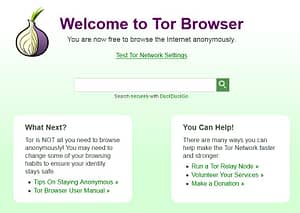What is The Dark Web?
There’s been a lot of news profile (see BBC) for what they call the ‘deep web’ or ‘dark web’ – but what exactly is it?
A quick search of the blog sites reveal the ‘surface web’, that’s to say the web pages we can see with a normal browser, is only the tip of the iceberg. In fact it’s estimated that the ‘deep web’ is 400 to 500 times larger than the surface web (and that’s just a guess). Based on that the traditional search engine caching process is only finding 0.03% of all web pages available!

Thor browser
So what’s in the ‘deep web’ or ‘dark web’?
Before you can see the ‘deep web’ you need to download a dedicated browser that can see these hidden web pages. We used a program call Tor to commence my journey.
Tor took about 3 minutes to download and install which gave us a google style search facility.
The onion is a symbol of the ‘deep web’ because it’s the layers you need to peel off to get into the really bad stuff. I spent just a few minutes searching the directories and found amongst many others…
- Passport forgery websites (it cost about £2500 for a coded, stamped passport with your image)
- Illegal drugs (50g ‘coffee shop’ grade cannabis is €250)
- Human medical experiments (operations on vagrants for ‘research’)
- Credit card fraud (purchase card details $80)
- ID card fraud (most US states)
- Guns (I saw a Glock and AK47 with ammo for sale)
- Password scams (didn’t go into this website!)
- Hire a hit man (€20,000 for a private citizen, up to €1.5m for a high politician)
- Sports events betting (known fixed event betting)
…and I’ve not even mentioned the P or S words!
Many of these items are delivered (or downloaded) by well known courier companies but the more risky items are ‘dropped’ at secret locations using GPS and landmark mobile phone photos.
bitcoins Payment
The currency of choice on the ‘deep web’ is another anonymous dodge called BitCoin, a non-government transaction that keeps the police and tax man at length. It’s as good as cash.
In theory, it’s possible to enter this country with a forged passport, pick up a gun and buy drugs – all on-line via ‘deep web’ using BitCoin payments.
[Wiki: Bitcoin is a payment system introduced as open-source software in 2009 by developer Satoshi Nakamoto. The payments in the system are recorded in a public ledger using its own unit of account, which is also called bitcoin. Payments work peer-to-peer without a central repository or single administrator, which has led the US Treasury to call bitcoin a decentralized virtual currency. Although its status as a currency is disputed, media reports often refer to bitcoin as a cryptocurrency or digital currency]
But this is the down side, there must be silver lining?
Yes, we suppose the obvious one is that oppressed folk living in despot countries can access like minded folk and talk about the atrocities they are enduring. Political activist can jump on an e-orange box and talk about anything without retribution
This is because the Tor program hides your IP identity. Your activity in the ‘deep web’ cannot be traced (allegedly).
The original onion routing was developed by the United States Navy in 1998 to help dissidents pass on information without revealing their names or location.
I found this brief experience in the ‘deep web’ very worrying and disturbing. If you think the ‘surface web’ is a lawless media, take a look at the depravation that prevails in ‘deep web’!
The question for us (law abiding good eggs) is can our enforcement agencies detect (let alone prosecute) offenders using the ‘deep web’?

 Previous Post
Previous Post Next Post
Next Post